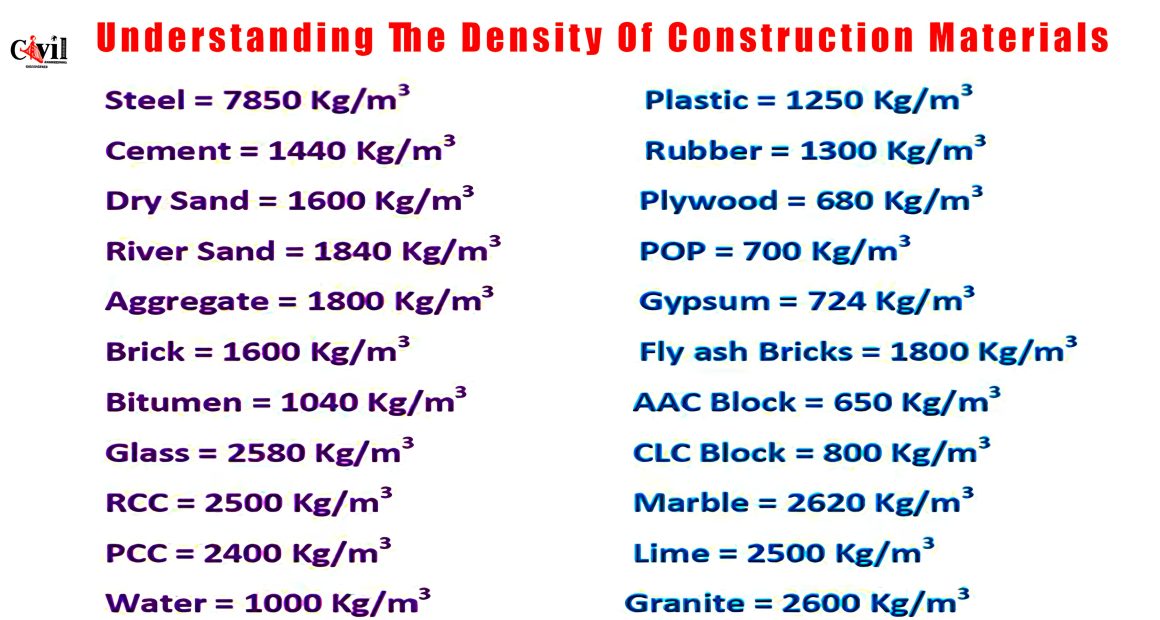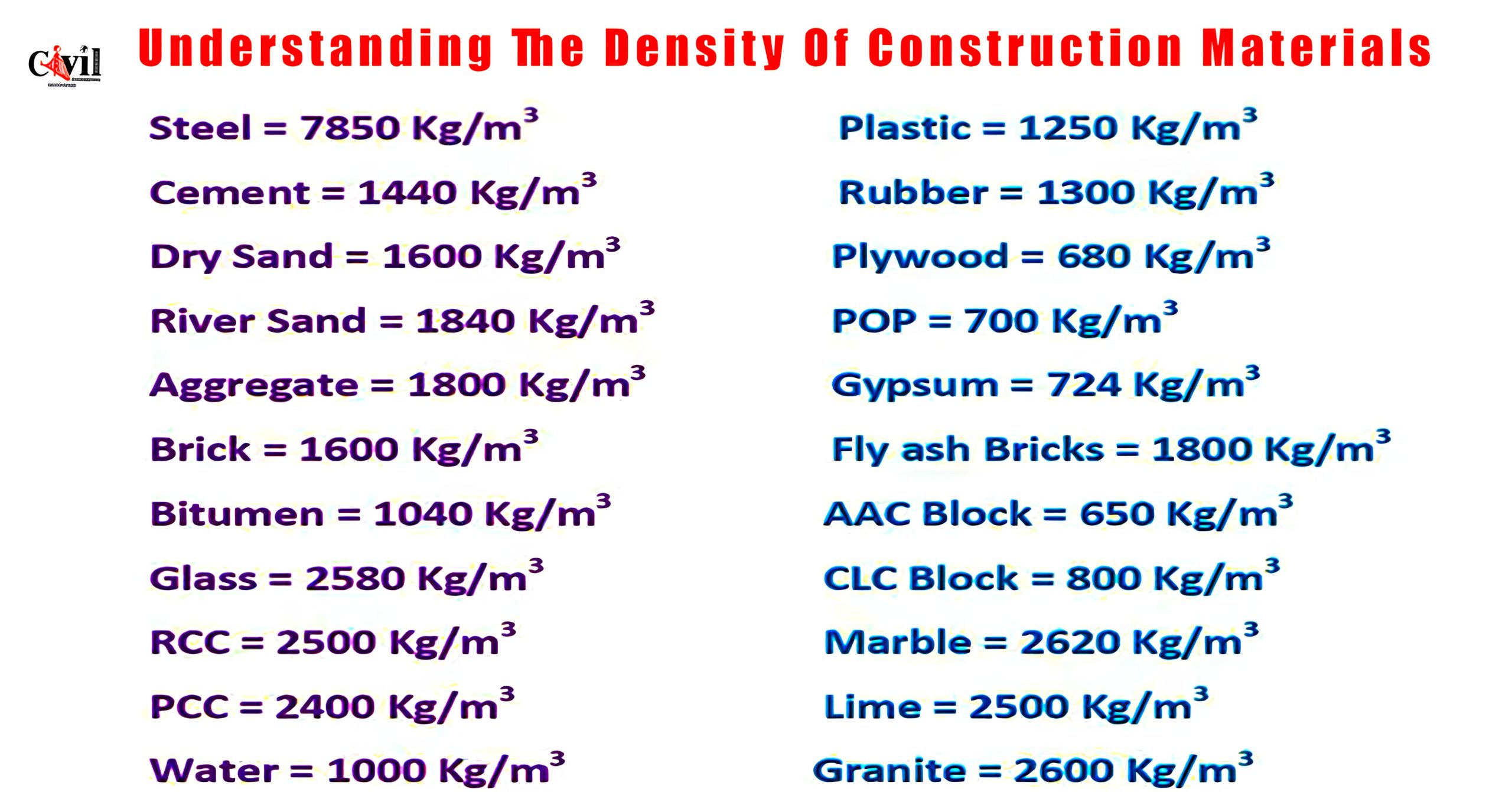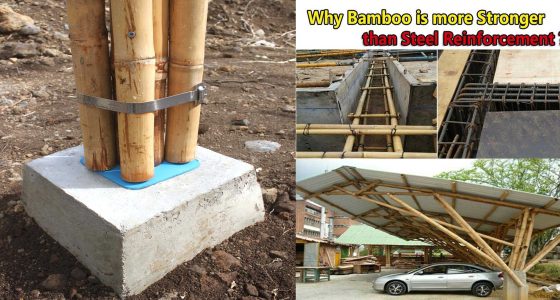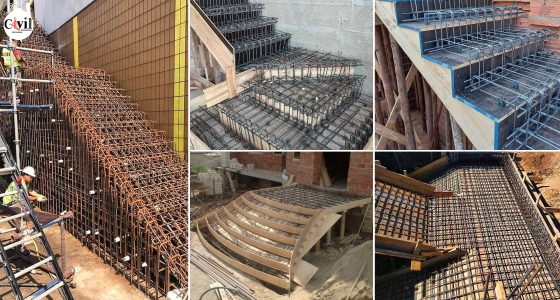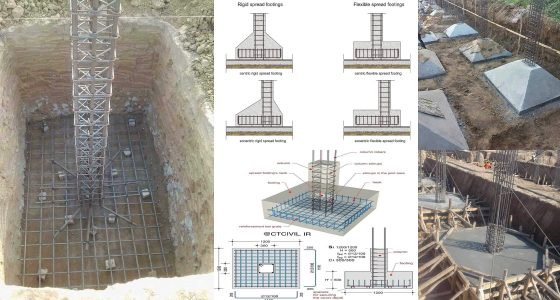The density of construction materials plays a crucial role in any structure’s strength, stability, and overall performance. Understanding these values is essential to choosing the right materials for specific projects. This article will explore the densities of various common construction materials, measured in kilograms per cubic meter (Kg/m³).
Density is the measure of how tightly a material is packed together. The denser a material, the more mass it contains within a given volume. This property directly affects the strength, weight, and durability of construction materials.
Metals
- Steel: 7850 Kg/m³
Steel is one of the densest and strongest materials, ideal for load-bearing structures and reinforcements.
Cement and Concrete
- Cement: 1440 Kg/m³
A vital binder in construction, used in making concrete and mortar. - RCC (Reinforced Cement Concrete): 2500 Kg/m³
Combining concrete with steel reinforcements for enhanced strength. - PCC (Plain Cement Concrete): 2400 Kg/m³
A mix of cement, sand, aggregate, and water without reinforcement.
Sand and Aggregates
- Dry Sand: 1600 Kg/m³
Used as a fine aggregate in concrete and mortar. - River Sand: 1840 Kg/m³
Slightly denser, often preferred for its purity and particle size. - Aggregate: 1800 Kg/m³
Crushed stones or gravel are used as coarse aggregates in concrete.
Bricks and Blocks
- Brick: 1600 Kg/m³
A traditional building material, suitable for walls and foundations. - Fly Ash Bricks: 1800 Kg/m³
Eco-friendly bricks are made from fly ash, sand, and cement. - AAC Block (Autoclaved Aerated Concrete): 650 Kg/m³
Lightweight and thermally insulating blocks. - CLC Block (Cellular Lightweight Concrete): 800 Kg/m³
Another lightweight alternative, ideal for partition walls.
Stones
- Marble: 2620 Kg/m³
A luxurious material used for flooring, walls, and decorative purposes. - Granite: 2600 Kg/m³
Durable and aesthetically pleasing, commonly used in countertops and cladding. - Lime: 2500 Kg/m³
Used for plaster, mortar, and as a binding agent.
Other Materials
- Plastic: 1250 Kg/m³
Lightweight and versatile, used in pipes and insulation. - Rubber: 1300 Kg/m³
Commonly used in shock-absorbing components. - Glass: 2580 Kg/m³
Provides transparency and strength for windows and facades. - Water: 1000 Kg/m³
An essential component in concrete mixes and curing. - Bitumen: 1040 Kg/m³
Used for waterproofing and road construction. - Plywood: 680 Kg/m³
Lightweight and flexible, ideal for furniture and interior work. - POP (Plaster of Paris): 700 Kg/m³
Used for molding, false ceilings, and wall finishes. - Gypsum: 724 Kg/m³
Another common material for plaster and boards.
- Structural Stability: Dense materials like steel and concrete provide excellent load-bearing capacity.
- Thermal Properties: Lightweight materials like AAC blocks offer better thermal insulation.
- Cost Efficiency: Understanding density helps optimize material use and reduce wastage.
- Durability: Denser materials are often more durable and resistant to external factors.
The density of construction materials is a fundamental property that influences design, construction, and performance. From steel to AAC blocks, each material has unique properties suited for specific applications. By understanding these values, builders and engineers can make informed decisions, ensuring the longevity and efficiency of their projects.
